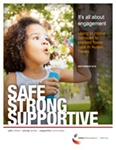How can safety science be applied within child welfare?
Scott Modell, Noel Hengelbrok, and Michael Cull introduce the concept of safety science and offer ways child welfare can respond differently to create a safety culture.
Scott Modell, Noel Hengelbrok, and Michael Cull introduce the concept of safety science and offer ways child welfare can respond differently to create a safety culture.
This webinar series details how two jurisdictions have approached evidence-based practice implementation in preparation for Family First.
Dr. Joia Crear-Perry explores issues of race, maternal and child health disparities, and how we can address bias in our work with families.
Dr. Deborah Daro, senior research fellow at Chapin Hall, outlines the goals of a public health approach to child welfare.
Dr. Jonathan Thackeray and Carrie Baker share collaborative efforts to improve pediatric practices and prevent recurrent child maltreatment.

This report chronicles the story of Austin’s In Home Services program. It is a story of courage, commitment, resilience and a lot of hard work.
This strategy brief describes the key strategies and lessons learned that Virginia employed to reduce reliance on congregate care.
All children deserve to grow up in a home-based setting. Learn how New Jersey decreased congregate care usage by 45 percent.
All children deserve to grow up in a loving, permanent family. This brief identifies strategies to achieve timely permanency.
The Parents for Parents program matches parents who have been reunified with those newly involved with child welfare to provide support and guidance.